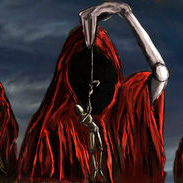In creating Ash - an "evil" character - one of the things that I hope becomes a vibrant part of his life is combat, particularly combat with other characters. I want him to become a force that some players might get behind, while others will oppose.
In looking through Miz threads, I'm hard pressed to find actual examples of players fighting other players. There are "combat training" threads that sort of kind of approximate the thing. There are instances of players fighting NPCs. But actual player vs. player combat RP seems extremely rare.
This is an aspect of RP I'd personally like to get some participation in, and I thought I would ask you - many of you very experienced and writers - what you believe are important things to maintain or do when it comes to player vs. player combat RP. What are the challenges, and what needs to happen to keep things fun for everyone?
- Getting Started
- Help
- Master Lists
- Useful Links
- Features
Player vs. Player
(This is a thread from Mizahar's fantasy role play forum. Why don't you register today? This message is not shown when you are logged in. Come roleplay with us, it's fun!)
26 posts • Page 1 of 3 • 1, 2, 3
-

Ashivirsthargon - OM NOM NOM
- Posts: 86
- Words: 50270
- Joined roleplay: February 11th, 2010, 12:21 am
- Race: Dhani
- Character sheet
- Storyteller secrets
- Medals: 3
-


-

-

Siiri - Beast of Prey
- Posts: 776
- Words: 521753
- Joined roleplay: September 18th, 2009, 3:22 am
- Location: Falyndar - Fall 512 AV
- Race: Myrian
- Character sheet
- Storyteller secrets
- Scrapbook
- Journal
- Medals: 7
-


-


-


-

Re: Player vs. Player
| Tarot's thread tickets: sold out. Not accepting any more threads for the time being unless I promised you one. Sorry for the inconvenience! |
-

Tarot - May you live in interesting times
- Posts: 2216
- Words: 766315
- Joined roleplay: March 23rd, 2009, 4:29 pm
- Location: Moderation abilities game-wide
- Blog: View Blog (11)
- Race: Staff account
- Office
- Scrapbook
- Plotnotes
- Medals: 5
-


-


-

-

Ashivirsthargon - OM NOM NOM
- Posts: 86
- Words: 50270
- Joined roleplay: February 11th, 2010, 12:21 am
- Race: Dhani
- Character sheet
- Storyteller secrets
- Medals: 3
-


-

Re: Player vs. Player
Montis "Hmph."
Montis Excited "Hmph!"
Montis Excited "Hmph!"
-

Montis - Diems Alt
- Posts: 11
- Words: 6682
- Joined roleplay: January 5th, 2010, 2:15 am
- Race: Kelvic
- Character sheet
-

Ashivirsthargon - OM NOM NOM
- Posts: 86
- Words: 50270
- Joined roleplay: February 11th, 2010, 12:21 am
- Race: Dhani
- Character sheet
- Storyteller secrets
- Medals: 3
-


-

Re: Player vs. Player
Though inland far we be,
Our souls have sight of that immortal sea
Which brought us hither.
~William Wordsworth, Intimations of Immortality
Our souls have sight of that immortal sea
Which brought us hither.
~William Wordsworth, Intimations of Immortality
Signature Credit goes to:
archistock.deviantart.com
jurgita.com
catskullcollector.deviantart.com
and the ever lovely and helpful Hex for putting it all together!
-

Satu - Flower of the Sea
- Posts: 556
- Words: 296249
- Joined roleplay: September 13th, 2009, 3:34 am
- Location: Yehebah
- Race: Konti
- Character sheet
- Storyteller secrets
- Scrapbook
- Medals: 5
-


-


-

-

Pua - Bald Jungle Hunk
- Posts: 84
- Words: 45470
- Joined roleplay: February 13th, 2010, 4:18 am
- Location: Taloba, Falyndar
- Race: Myrian
- Character sheet
- Storyteller secrets
- Scrapbook
- Medals: 1
-

-

Gossamer - Words reveal soul.
- Posts: 21150
- Words: 6362535
- Joined roleplay: March 23rd, 2009, 4:40 pm
- Location: Founder
- Blog: View Blog (24)
- Race: Staff account
- Office
- Scrapbook
- Plotnotes
- Medals: 11
-


-


-


-


-


-

Ashivirsthargon - OM NOM NOM
- Posts: 86
- Words: 50270
- Joined roleplay: February 11th, 2010, 12:21 am
- Race: Dhani
- Character sheet
- Storyteller secrets
- Medals: 3
-


-

26 posts • Page 1 of 3 • 1, 2, 3
Who is online
Users browsing this forum: No registered users and 0 guests


 Of course it's really no-one's fault if people don't do the kind of actions that lead to PvP. Maybe there hasn't been a bloodthirsty killer on a rampage that others had to stop. There hasn't been a true feud either (though I am on my way to modding a possible PvP situation... or more than one if you count the Game, since I can't predict exactly what is going to happen there.) Maybe people are, whether consciously or not, afraid to lose a character on which they have invested time and affection.
Of course it's really no-one's fault if people don't do the kind of actions that lead to PvP. Maybe there hasn't been a bloodthirsty killer on a rampage that others had to stop. There hasn't been a true feud either (though I am on my way to modding a possible PvP situation... or more than one if you count the Game, since I can't predict exactly what is going to happen there.) Maybe people are, whether consciously or not, afraid to lose a character on which they have invested time and affection.